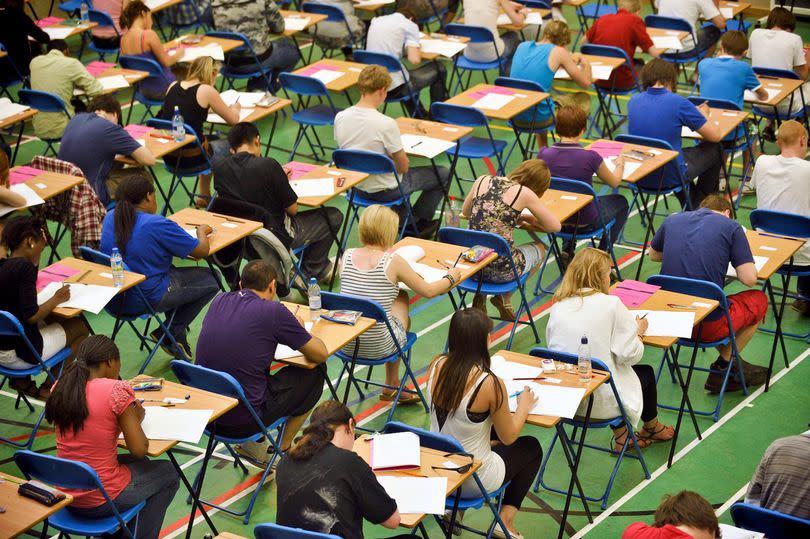I attempted SATs questions set for 10-year-olds and felt like an idiot

It's that time of year again when Year 6 pupils up and down the country are taking their SATs tests. It can be a daunting time for children so young to face such pressure before they move on to secondary school.
SATs have been taking place this week, with kids aged 10 or 11 being put through their paces in a number of subjects including English, maths and science. With that in mind, I decided to see whether I was smarter than a 10-year-old by tackling some of the SATs questions.
Would I have an easy time or would all that stuff you learn at school have seeped away from my brain? It's now over 20 years since I took my SATs, so that's entirely possible.
READ MORE: Martin Lewis says women born after this date could be owed thousands of pounds
We are now on WhatsApp. Join our dedicated community here
Enter our £1,000 Aldi voucher giveaway and go wild in the aisles
I write for a living, could tell you the capital of Peru and who won the FA Cup in 1998. I tell myself I'd do alright on The Chase but stick an algebra equation in front of me and I'm in deep trouble.
I'm in a no-win situation here, aren't I? Sail through it and I've answered some questions set for 10-year-olds. Well done. Get some wrong and.. well, let's hope my boss doesn't read this.
I managed to find last year's maths SATs paper online to see the sort of questions pupils will be tackling this week. Calculators weren't permitted in this test and you'll have to take my word that I'm not using one. Here goes...
Question 1: 707 - 10 =
Phew. A nice easy starter for 10 to settle any nerves. That's 697.
I had to carefully check and just make sure before entering that answer, like they do on the £100 question on Who Wants to be a Millionaire so they don't make themselves look a berk on national TV. A nice early settler.
Question 2: 6,138 + 456 =
It's ok. Don't be overawed by the big numbers. Just take a second and work it out.
Remember calculators aren't allowed, so this could be tricky for a Year 6 pupil. I'm fairly confident the answer is 6,594.
Question 3: 4 x 702 =
Again, this looks difficult for a 10 or 11-year-old with no calculator. This is the part where you start scribbling down your workings, carrying the one, etc.
Talk amongst yourselves. Four times seven is 28 so four times 700 is 2,800. And four times two is eight. 2,808 is my answer, not entirely confidently.
Question 4: 2 x 4 x 30
They're starting to get harder, this much is clear. I assume it's two times four, and then that answer (eight) times 30 but I'm not certain.
If that is the right way to work it out, the answer should be 240.
Question 5: 450/9
A pretty daunting question to be presented with, at any age I would suggest. That's 450 divided by nine for anyone who is unsure.
I've had a brainwave, thankfully. How many nines in 45? That's five. So the answer should be 50 (as 45 times 10 is 450).
Question 6: 3 over 16 + 5 over 8
Not fractions. Do I just add the numbers on the top and the bottom here? I was never sure.
That's the only answer I've got so I'm saying 8 over 24. Hang on. That is equal to 1 over 3 or one third (as eight times three is 24), so I'm guessing that's the answer.
Question 7: 1 over 8 divided by 3
This is tricky, for anyone I would say. So half of one eighth would be one quarter.
I think it's between a quarter (one over four) and a half (one over two) but I'm not sure. My answer is one over three (or a third).
Question 8: 38% of 750
I would suggest many adults would struggle to know where to start with working this one out. It may be a long-winded way but this is how I've always done it. Bear with me.
10% of 750 is 75. And 75 times three is 225. So that's 30%. Now for the other 8%.
1% of 750 is 7.5 (as it is divided by 100). Then times that by eight, which is, I believe, 60. So 225 + 60 = 285.
Thank god that's over. Confused after all of that? Well, you aren't the only one. Keep in mind these were only eight questions picked out of a total of 36 which pupils have to answer in just 30 minutes.
That's less than a minute for each (thank you, maths) with the tight time limit only adding to the pressure. So it's by no means easy.
I reckon many adults will have struggled to answer many of the questions set for 10 and 11-year-olds. We can all sympathise with what these young kids are having to face this week and be thankful our school days are long behind us and we'll never have to go through it again.

 Yahoo News
Yahoo News 
